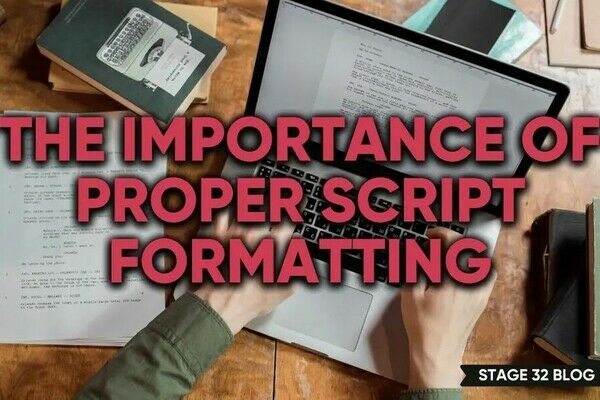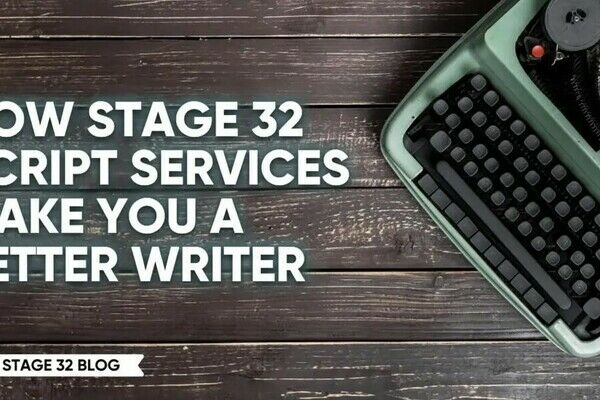THE STAGE 32 BLOG Subscribe
Welcome to the Stage 32 Blog. Browse the archive, browse by tags, or search to get started...
Search Stage 32 Blog
There are now 4033 blog posts for you to enjoy. Search them all by tags below.
Acting, Advice, Cinematography, Coffee & Content, Composing, Contests, Distribution, Featured, Filmmaking, Financing, Inspirational, Networking, Producing, Screenwriting, Success Stories, Tips, Trending,Recommended Articles

The Importance of Proper Script Formatting

How Stage 32 Script Services Make You A Better Writer

Insider Intel: A-listers Are Dead. Long Live A-listers.

7 Life Hacks For Creatives

Forbes Spotlights Stage 32 Certification!

Coffee & Content: Why Your Next Step Matters More Than the Perfect Step

November Write Club Week #3: How To Make A Strong First Impression When Meeting Execs, Producers, & Reps

How Modern Franchises Became Our New Religion

Green Lights and Grey Areas: Expanding Creative Collaboration in Publishing

Insider Intel: Packaging your Project- The Chicken or the Egg Dilemma
How Identifying with Criticism Can Destroy Us
I had an uncomfortable experience recently with a writer friend who experienced a failed pitch to a significant producer. He spent weeks honing the pitch, hiring pitch-stars to coach him, practicing in front of his mirror, his cat, and me. And then, the morning of the big meeting and the dog-and-pony show began. Twelve minutes after he started, he was standing at the elevators waiting to get in his car, and cry. The next day we spoke. “Twelve minutes!” He moaned to me.&ldqu…
The 10 Questions Every Writer Needs to Ask Before They Hire an Editor or Script Consultant - Part 2
In Part 1, I examined the five essential questions every writer must ask any third-party consultant BEFORE they hire him/her for a freelance position, be that book line editing, developmental editing, story structure help, screenplay writing help, or any generic service related to publishing or the entertainment business. But, as I said in Part 1, those five questions are just one side of the equation of freelance hiring. The following five questions are designed to balance the equatio…
The 10 Questions Every Writer Needs to Ask Before They Hire an Editor or Script Consultant - Part 1
Whether you are a screenwriter, novelist, or creative nonfiction author, at one point in every writer's experience there comes a day when you decide you need help. Maybe the narrative wheels came off the cart, maybe you wrote yourself into a dead end, maybe you found yourself drowning in the story flood plains with no land in sight, or maybe you just want to get an opinion on your work that is not your mother's? Whatever the reason, you determine that hiring a third-party expert might be…
Bust the Top Ten Creative Writing Myths to Become a Better Writer: Part 2
My last blog, part one, looked at five of the top ten creative writing myths responsible for much of the pain associated with failed writing and derailed storytelling . We examined, in reverse order of destructiveness, the myths ten through six: #10: Show don't tell. #9: The blank page is the enemy. #8: Write what you know. #7: Real writers write every day. #6: Storytelling and writing are the same. Now, we look at the top five myths, the worst of the worst and break down the lie a…
Busting the Top Ten Creative Writing Myths to Become a Better Writer - Part 1
We live in the age of click bait, sound bites and viral memes. On any given day, hour, minute, or second on Twitter, Facebook, or Instagram, you can find any number of cat videos or fortune-cookie platitudes meant to bolster one or another emotional cliché or bubble-gum metaphysical insipidity. They reflect our moods and emotional states, reinforce happy thoughts, or confirm our darkest vulnerabilities. We read them, consume them, have a laugh or a wistful shrug of self-reflection…
Attack of the Three-Act Structure: Run for Your Lives!
I've tackled many popular writing myths and memes over the last several years: writer's block, the idea of the high-concept, that outlining is a bad thing, that writing groups work, to name just a few, but now, I think we are ready to grapple with the granddaddy of all writing memes: the three-act structure. Whether it's three, five, six, or seven acts, it doesn't matter. 'Acts' are all useless to writers, as storytellers. For many, when I say this with such certainty, with such s…
Should I Take a Dollar Option on a Screenplay?
You get the phone call and it goes something like this: Friend: Hey, are you sitting down? (Smile in his voice).You: Yeah, what’s up?Friend: I have a producer who wants to option your script!You: (heart flutters) Oh my god …Friend: Yeah, he’s an indie producer I know—really talented, really connected.You: How much for the option?Friend: (long beat) Well, he wants a dollar option because you haven’t been produced yet. But he’s really connected, and he…
Script to Novel: The 6 Biggest Hurdles to Turning Your Screenplay into a Book
Traditionally published novels have always been a lucrative source of literary properties for the entertainment industry, but, in the last decade more and more self-published books have joined the page-to-screen trend and are responsible for building some of the biggest entertainment franchises, supporting billions of dollars in global box office revenue, (for example, Amanda Brown’s Legally Blond (2001), E.L. James’s Fifty Shades of Grey (2011), Andy Weir’s The Martian…
The 7 Step Process for Busting the Myth of Writer’s Block
As writers, we all have come to accept certain maxims to be true, or at least we have grown so familiar with the consensus memes of the creative writing world, that we have become unwitting suckers, blindly accepting them, without exercising personal discernment and healthy skepticism as artists. The memes I’m speaking of have become normalized and homogenized, so much so that we accept them as if they are true, have always been true, will forever be true: 1. Good stories write t…
Writing the Moral Premise and the Biggest Mistake Writers Make
The idea that any good story has a moral heart is not a new idea. Writers, story gurus, developmental editors, everyone who has had any experience with storytelling talks about the importance of having a moral element that drives the protagonist (and antagonist) in any good story. There are many terms people use: moral argument, moral problem, moral flaw, fatal flaw, inner-fault the list goes on, but regardless what the proprietary language used, everyone who advocates for this basic pri…
Story Development Tools & Techniques—'The Whistles and Bells Test™'
'The Whistles and Bells Test™' is a quick test you can carry out whenever you get the inspirational flash of a new story idea. It is a simple, cut-to-the-chase technique that can quickly give you a sense if you have either a story or a situation. It is not a substitute for learning the difference between a story and a situation, or for working through the full premise development process, but over time, with a lot of practice, using this test you can hone a kind of sixth-sense for …
High Concept—It Actually Means Something!
As writers, we have all come up against the agent, publisher, studio hack, or fellow writer who, when asked to give feedback on our story retorts, “Yeah, good idea, but … it needs to pop more. There’s no high concept.” Sigh, and what the heck does that mean? What are you supposed to do with that? People throw this phrase around like the definition is common knowledge, but when asked to explain their sorry selves, these same people only deliver clichés, lik…













